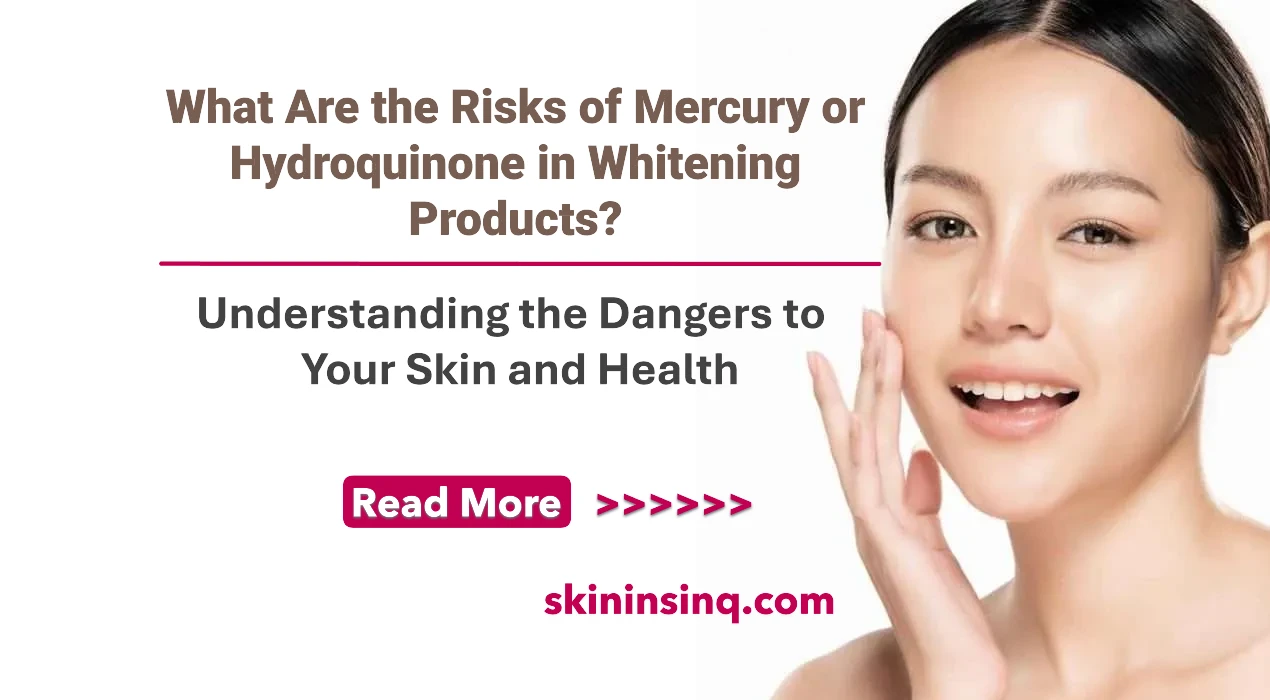What Are the Risks of Mercury or Hydroquinone in Whitening Products? Understanding the Dangers to Your Skin and Health
What Are the Risks of Mercury or Hydroquinone in Whitening Products? Understanding the Dangers to Your Skin and Health
Skin whitening products are widely marketed for reducing dark spots, hyperpigmentation, and achieving a lighter complexion. However, many of these products contain potentially harmful ingredients—particularly mercury and hydroquinone. While they may offer short-term results, the long-term health and safety risks are significant and often overlooked. Understanding these dangers is essential for making informed skincare choices.
1. Mercury: A Toxic Heavy Metal
Mercury is sometimes added to whitening creams for its ability to inhibit melanin production. However, its use in cosmetics is banned or restricted in many countries due to its severe toxic effects.
Health Risks of Mercury:
-
Skin Damage and Irritation: Mercury can cause rashes, redness, burning sensations, and skin thinning with prolonged use.
-
Kidney and Nervous System Damage: Mercury absorbed through the skin can accumulate in the body, leading to kidney failure or neurological problems such as tremors, memory loss, and anxiety.
-
Mercury Poisoning: Symptoms include fatigue, muscle weakness, and mood swings. It can also disrupt the immune and endocrine systems.
-
Cross-Contamination Risk: Mercury can spread to others through towels, bedding, or skin contact, posing a danger to children and family members.
Many products containing mercury are illegally sold without proper labeling, especially in unregulated markets or online.
2. Hydroquinone: Controversial Skin Lightener
Hydroquinone is a chemical compound that works by blocking melanin production in the skin. It is commonly used to treat conditions like melasma and age spots but is often misused in over-the-counter whitening products.
Risks of Hydroquinone:
-
Ochronosis: Long-term use can lead to a condition called exogenous ochronosis—where the skin becomes darkened and thickened, especially in darker skin tones.
-
Skin Sensitivity and Allergic Reactions: Hydroquinone may cause redness, stinging, peeling, or swelling, especially when used in high concentrations or under sunlight.
-
Carcinogenic Concerns: Some animal studies have suggested a potential link between hydroquinone and cancer, prompting regulatory bans or restrictions in countries like the EU and Japan.
-
Sun Sensitivity: Hydroquinone-treated skin is more prone to sunburn, making daily sun protection essential.
Although hydroquinone is approved in low concentrations (usually 2% or less in OTC products in some regions), unsupervised or long-term use increases the risk of adverse effects.
How to Protect Your Skin
-
Read Labels Carefully: Avoid products with mercury, mercurous chloride, calomel, or hydroquinone over 2% unless prescribed.
-
Buy from Trusted Sources: Choose reputable brands that follow safety regulations and provide full ingredient transparency.
-
Consult a Dermatologist: For pigmentation issues, it's best to seek professional guidance and explore safer alternatives like azelaic acid, niacinamide, kojic acid, or vitamin C.
-
Stay Informed: Don’t rely on unverified beauty trends or imported products that might bypass local health regulations.
Final Thoughts
The desire for clear, even-toned skin should never come at the cost of your health. Mercury and hydroquinone may promise quick results, but the risks they pose can be long-lasting and dangerous. Prioritize safe, dermatologist-approved ingredients, and remember that healthy skin comes in all shades.

Related Blog
What Causes Oily Skin and Can It Be Managed Naturally? Exploring Root Causes and Gentle Solutions
Aug 2, 2025 by Admin
General
What Are the Signs That You Have Sensitive Skin? Key Symptoms to Help You Identify This Delicate Skin Type
Aug 1, 2025 by Admin
General